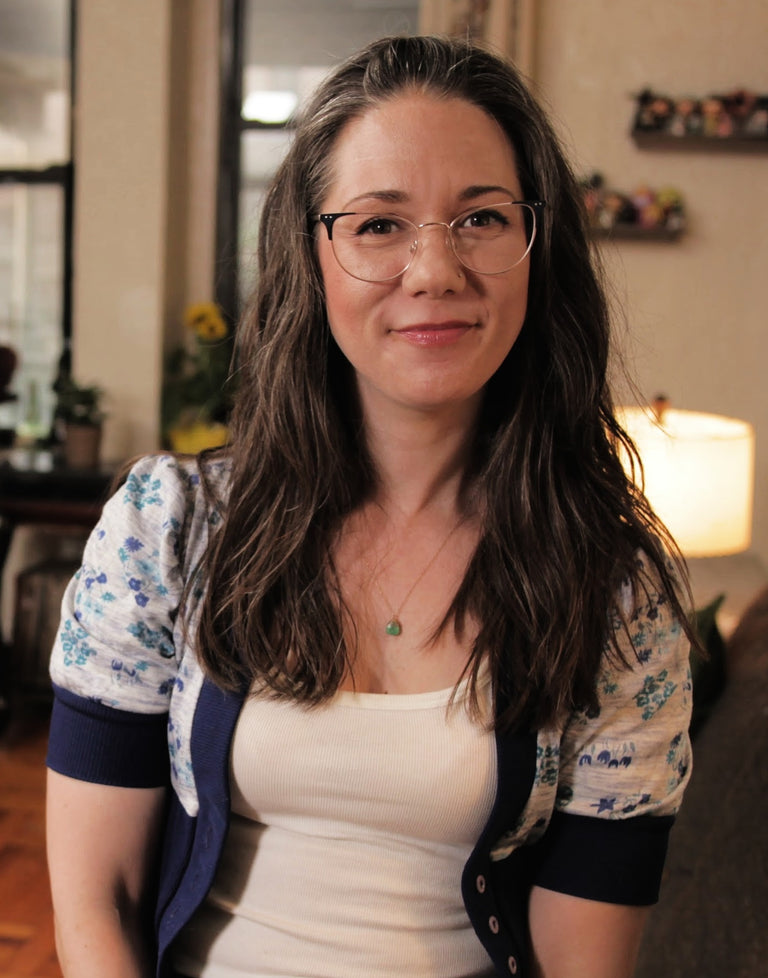If your hair goals involve more hair growth STAT, it might be frustrating to hear that there is no magic silver bullet. That there is no one easy thing you can do to make your hair grow faster and live your best hair life. Healthy hair growth begins at the scalp, and more specifically in your hair follicles.
The best way to help stimulate new growth is through a holistic effort that considers the many factors influencing your hair growth to begin with. Read on to gain some inspiration, along with useful tools you can add to your hair care toolkit to help support healthy hair.
8 Steps To Stimulating Hair Growth
You are born with all the hair follicles you’ll ever have: about five million in total. Of these, about 100,000 follicles are on your head.
So, when you want to stimulate hair growth, it's all about stimulating the existing follicles you have. You cannot grow new follicles on your scalp! Genetics, lifestyle and hair care habits (among other things) will all impact your hair density and hair growth at any given moment in time.
Some of these factors are beyond your control, but there are a few tricks and tips you can use to support hair follicles and even give them a little push to help encourage new hair growth. Just remember, there isn’t a single ingredient or method that will guarantee new growth. Hair health should be considered as part of your holistic health and wellness goals!
1. Massage Your Scalp
Speaking of scalp massage, you might be able to help encourage new hair growth while indulging in some feel-good self-care. Early research has shown that consistent, daily scalp massages can help promote hair growth by promoting increased blood circulation to the blood vessels in hair follicles.
“Hair growth comes from healthy blood flow in the scalp and body,” shared Madison Dufour, a licensed cosmetologist, barber and founder of The Exquisite Find hair blog. “If the blood flow is compromised, this can affect hair growth,” she said.
“You can also try to massage it with vitamin E oil or aloe vera gel,” said Dr. Carrie Lam, a board-certified medical doctor who specializes in family, anti-aging and regenerative medicines.
2. Consider Platelet Rich Plasma (PRP) Treatment
Platelet-rich plasma (PRP) treatments were first developed in the 1970s and have since been used as treatment options for many different medical applications. The reason? Platelets are pretty versatile cells.
“Platelets promote cell growth and regeneration by secreting growth factors to enhance wound healing and tissue growth,” explained Dr. Kimberly Lee, a board-certified facial plastic and reconstructive surgeon.
“Platelets that are injected directly into the scalp can stimulate follicles to grow hair,” she said. While more research is needed, initial human clinical trials have shown that PRP treatments can be effective in combating hair loss.
“One important caveat about PRP: because you can't actually see the platelets in the PRP, it's important to go to a trustworthy physician who can assist you,” advised Dr. Lee.
3. Support Follicles With Healthy Food
Another important way you can promote hair growth from the inside out is with healthy food choices and a balanced diet.
“A healthy and balanced diet is better for the body overall, including your hair,” said Dufour.
“For the body, hair is like an afterthought. If your body isn’t healthy then hair growth will not be the priority,” she added.
Many of the vitamins, minerals, and fatty acids that are especially important for your overall health also play a foundational role in hair growth:
- Biotin (vitamin B-7)
- Vitamin B-5
- Vitamin C
- Vitamin D-3
- Vitamin E
- Vitamin A
- Zinc
- Iron
- Omega fatty acids
Think about consuming a wide variety of fresh fruits and vegetables to supply your body with lots of nutrients, minerals and antioxidants. Healthy fats from foods like avocados, nuts and olive oil, along with plenty of protein, help provide the building blocks for hair.
“Omega 3 fatty acids have a lot of nutritional value,” said Dr. Lam. “The anti-inflammatory properties can promote health and reduce hair loss by opening up follicles,” she explained. In fact, one study showed that six months of supplementation might help increase the number of hairs in the active (anagen) hair growth phase. Great food sources of omega-3s include flaxseed, walnuts, and plant oils.
Pumpkin seed oil is another plant oil rich in omega 6 fatty acids that has also been shown to support hair growth.
4. Harness the Power of an Essential Oil
“Several essential oils such as peppermint and rosemary have been proven as or more effective than their chemical counterparts in preventing or reversing hair loss,” shared Damon Henrichs, barber and founder of ManBasics.
Essential oils not only smell amazing and can have real aromatherapeutic benefits, but initial research does support that both rosemary oil and peppermint oil could help promote hair growth. While more research is needed to support these findings, you might consider adding rosemary or peppermint oil to your next scalp massage.
Read: How to Strengthen Your Hair
5. Manage Stress
Stress is a sneaky culprit when it comes to your health. It’s been definitively linked to so many different medical conditions, and, yes, it can have real impacts on your hair.
Stress can very clearly (and unpleasantly) impact your hair by inducing the sudden hair loss associated with telogen effluvium (TE), but it can also cause more subtle damage over time. Seriously, stress is the worst.
When it comes to supporting your body in growing new fabulous hair, managing stress has got to be part of the game plan. This means thinking about things like:
Stress management, just like supporting your hair follicles, is a holistic concern that needs to be tackled from many angles. Pick up as many tools in the stress-busting toolkit as you can.
6. Show Your Scalp Extra TLC
If stimulating new growth is an important hair goal for you, then you’re going to need to shower your scalp with kindness. Think of it as pampering those follicles so they can kick back into growth mode.
Be gentle with your hair. Wash it only when needed to preserve natural oils and avoid drying out the scalp. Skip tight hairstyles like buns, ponytails, weaves and braids whenever you can. Brush your hair gently, and minimize heat styling whenever possible. If you do style your hair, use a heat protectant. Skip hair color if you can, which can also damage your hair.
7. Keep Your Strands Strong
Trim split ends regularly to prevent the breakage from snaking up the hair shaft. When these split strands break off, it leads to thinner-looking hair.
And add a little strength back to your strands with the power of keratin. Keratin is a protein building block made by the body to build each and every hair shaft. When your locks are lacking protein, you can use keratin-infused hair care products to build them back up. While more research is needed, an early study showed that topical keratin might improve hair thickness, strength and smoothness.
8. Consider DIY Natural Treatments
There are lots of natural DIY treatments touted as being effective in stimulating hair growth.
“It’s hard to say which DIY remedies actually work,” said Dr. Lee. “Sometimes they can cause irritation to the skin, leading to dryness and hair loss,” she added. Remedies like lemon juice and castor oil are the go-to options for many, but studies show they have little or no clinical evidence to support their claims.
One study looked at the composition of coconut oil, sunflower oil and mineral oil. Researchers found that, among the three oils, coconut oil was the only one to reduce protein loss in hair when used as a pre-wash and post-wash hair treatment.
“My personal and professional favorite natural hair mask remedy is a flaxseed gel mask,” shared Dufour. “It is all-natural and heavy in vitamins B and E,” she explained. “Vitamin B nourishes the scalp and the follicles, while vitamin E eradicates the free radicals that roam on the scalp and slow hair growth.”
Talk To Your Doctor
“If hair loss is occurring because of a serious medical treatment or illness, these tactics may be less helpful because the body at this point is trying to heal. Hair is an afterthought, not the priority at that point,” said Dufour.
Hair growth is complicated and can be impacted by myriad factors. If you think you’re shedding way too much, have noticeable hair loss, or you’re otherwise worried about your hair health, talk to a specialist like a dermatologist or a trichologist. If medications or an undiagnosed medical condition is the root cause of your hair thinning, following the steps outlined above might not cut it when it comes to hair regrowth.
“It's important to rule out medical causes of hair loss, such as hypothyroidism,” said Dr. Lee. “In those cases, treating the underlying problem can also help restore hair,” she added.
The Takeaway
Despite the fact that many people wish it were otherwise, there is no magic solution that will cause hair to grow faster or give you effortless luxuriously long hair. The best way to stimulate hair growth is by taking a holistic approach to your overall health.
Healthy hair starts on the inside, so be sure to manage stress and eat well. Scalp massage with essential oils, platelet-rich plasma (PRP) injections. Brushing your hair gently and being gentle when styling will help avoid putting undue strain on hair follicles. If you’re worried about excessive hair shedding or hair loss, or if you think your hair problems are serious, speak to a doctor to make sure there aren't any underlying health conditions at play.
More From VEGAMOUR:
- Does Rosemary Oil Really Help With Hair Growth?
- 5 Reasons You Should Use a Weekly Hair Mask
- Getting to The Root of Natural Hair Breakage
Photo credit: Brooke Cagle/Unsplash
Back


















